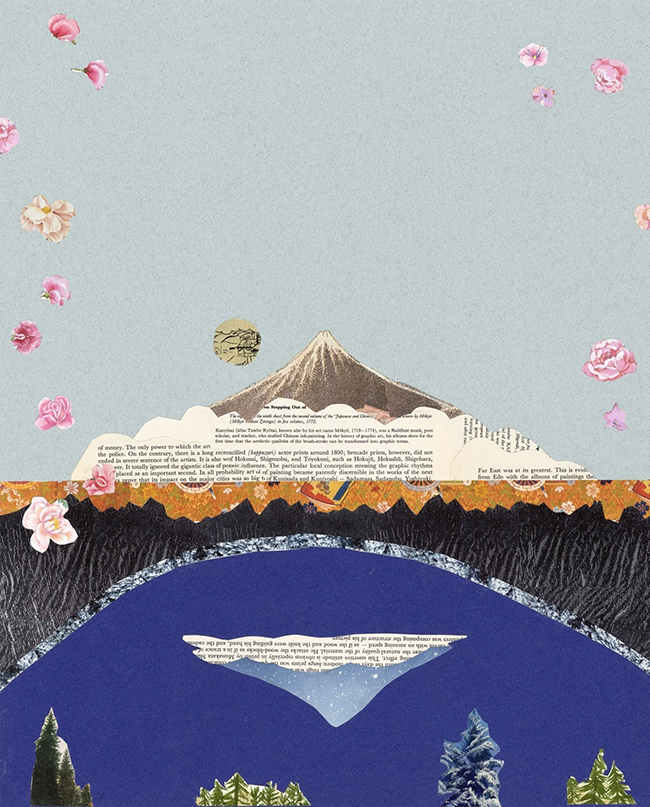Lori Markman is an artist based in Los Angeles, whose work spans painting, drawing, and collage. With a BFA in painting from UCLA and an award for Special Achievement in Art, Markman has developed a career that connects both local and international audiences. Her works have found homes in private collections across the United States and Europe, and she has exhibited in various venues, including solo shows at the Sasse Museum of Art in Pomona, California, and Space Gallery in New Orleans, as well as group exhibitions at places such as the Riverside Art Museum and the Masur Museum of Art.

Markman’s work is often appreciated for its unique blend of traditional and contemporary elements, particularly her collages, which are carefully crafted and conceptually engaging.
One of Markman’s pieces is her collage titled “The Reflection of Fuji.” This work exemplifies her ability to blend harmony, balance, and beauty in a way that echoes the aesthetics of traditional Japanese landscape art while maintaining a distinct contemporary edge. The collage, inspired by the serene and structured beauty of Japanese prints, uses a variety of materials, including Japanese prints, text from an art book, colored paper, photographs, and greeting cards. Each element is precisely cut and placed, resulting in a landscape that feels both magical and illogical—a blend of reality and fantasy that challenges the viewer’s perception.
“The Reflection of Fuji” reflects Markman’s fascination with the interplay between tradition and modernity. By using materials that have their own histories and contexts, she creates a dialogue between the past and the present, inviting viewers to explore the layers of meaning within the piece. The use of Japanese prints and text roots the work in a specific cultural and artistic tradition, while the inclusion of everyday items like greeting cards and photographs adds a personal and contemporary touch.
Markman’s approach to collage is both deliberate and intuitive. She carefully selects and arranges each piece, paying close attention to the balance of color, texture, and form. However, there is also a spontaneity in her work—a sense that the materials themselves are guiding the creation of the piece. This balance between control and freedom is a hallmark of her artistic practice, and it allows her to create works that are both deeply considered and full of life.
In addition to her collage work, Markman’s paintings and drawings also reflect her interest in combining different elements and influences. Her work often explores themes of memory, identity, and place, using a variety of techniques and materials to create rich, layered images. Whether she is working with paint, pencil, or paper, Markman’s work is characterized by a deep sensitivity to the materials she uses and the stories they can tell.
Markman’s exhibitions, both solo and group, have allowed her to share her work with a wide audience. Her solo shows, such as those at the Sasse Museum of Art and Space Gallery, have provided an opportunity for her to present her work in a focused and cohesive way, while her participation in group exhibitions has allowed her to engage with a broader artistic community. These exhibitions have not only showcased her work but also highlighted the diversity and versatility of her artistic practice.
As Markman continues to create, her work progresses, but it remains rooted in her commitment to exploring the possibilities of different materials and techniques. Whether through the delicate balance of her collages or the expressive depth of her paintings and drawings, Lori Markman’s art invites viewers to see the world through her eyes—a world where tradition and modernity, the personal and the universal, all come together in a harmonious and compelling way.
In the end, Lori Markman’s work is a testament to the power of art to bridge cultures, times, and experiences. Through her thoughtful and creative use of materials, she creates works that are both deeply personal and universally resonant, inviting viewers to embark on their own journeys of reflection and discovery.

